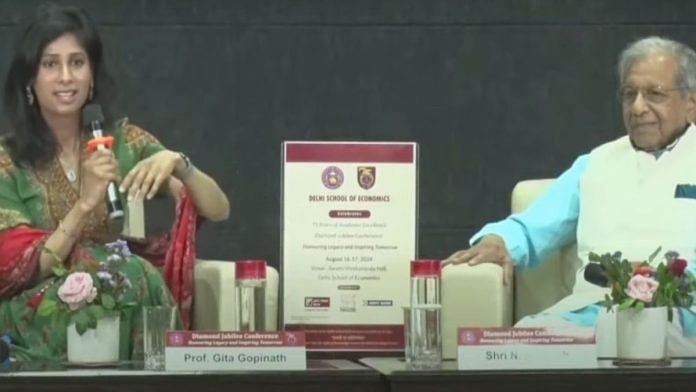New Delhi: India needs several structural reforms to become a developed country by 2047, key among them being the implementation of the labour codes by states, widening the tax net and simplifying the Goods and Services Tax (GST), and encouraging trade expansion through import tariff reductions, said Gita Gopinath, First Deputy Managing Director of the International Monetary Fund (IMF).
Speaking during a fireside chat with Fifteenth Finance Commission chairman N.K. Singh at the Delhi School of Economics’ Diamond Jubilee function Saturday, Gopinath added that though India’s average growth between 2010 and 2020 was at 6.6 percent, the employment growth rate was under 2 percent, reflecting a low focus on labour development in the country.
To reverse this trend, the policy framework should be reviewed so that firms are not penalised for hiring people and states should be incentivised to implement the labour laws, she said.
She pointed out that reforms like investment in education and skilling, infrastructure and health should be increased.
Gopinath also suggested ways that India could increase its fiscal resources available, adding that though this couldn’t be done by reducing expenditure, there were ways to make expenditure more efficient, while also increasing revenues through taxes.
“India is the fastest growing economy among the major economies. The question is how to keep up the momentum in the long run,” she said.
The IMF economist pointed out that it was very critical to implement the labour codes that were passed in Parliament in 2019, calling them a “nice blend between labour market flexibility but also protecting labour rights”.
She also lauded the government’s measure to cut corporate taxes. However, she pointed out that emphasis should be put on managing tax exemptions to ensure the government does not end up giving more than what it is collecting.
She suggested that property taxes — currently an “untouched territory” for India — could yield good revenue in the longer run, and that the government should make sure it is earning enough from capital gains.
Apart from these, she spoke about the need to simplify GST, for the numbers of rates to be reduced, and the tax net widened.
“An additional 1.5 percent of GDP can be raised from further rationalisation and simplification of GST rates,” she said.
Gopinath also said that India’s import tariffs were currently too high compared to other similar countries, which could discourage foreign trade and the inflow of funds in the country. These rates would need to be reduced, she added.
On the expenditure side, she pointed out that the exigencies of developing countries were such that they couldn’t reduce expenditures and, in fact, needed to expand it, but added that there were some areas that could do with reform.
For example, she highlighted India’s fertiliser subsidies, which she said was currently “untargeted” and “given in unlimited amounts”. Giving an example of a pilot project being run by Karnataka, Gopinath suggested that these subsidies could be tailored to the size of the farm.
Gopinath also emphasised on the need for education and tech skilling of Indians as key to increasing employment and per capita incomes.
While the widespread use of technology and artificial intelligence poses a potential threat to employment, governments should focus on framing policies that do not tilt towards automation.
“It is a long-standing problem that there is a skill mismatch in the workforce,” she said. “Therefore, India should invest in revamping the education system, to ensure people have more years of education and a better quality of education. It will not deliver results instantly, it will take time, but it needs absolute fixing now. Otherwise, we are perennially stuck in a situation of a workforce that is not sufficiently skilled.”
(Edited by Zinnia Ray Chaudhuri)
Also read: Can India earn ‘developed’ tag by 2047? GDP growth seems elusive, human development may be easier



